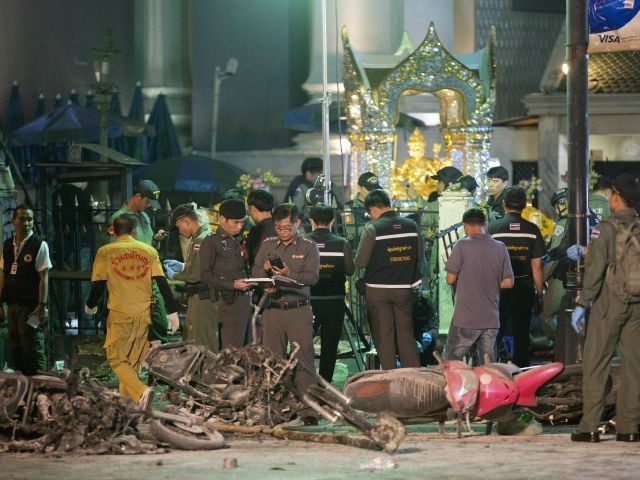Malaysian authorities on Monday announced the arrest of three suspects—two Malaysians and a Pakistani national—in connection with the August 17 terrorist bombing of the Erewan shrine in Bangkok, in which 20 people were killed.
One of the Malaysian suspects is reportedly a woman. Meanwhile, the man Thai police have described as a leader of the plot is thought to be hiding in Turkey.
Reuters reports that the three suspects arrested in Malaysia are “assisting with the investigation.” Thai police were following leads on the notorious “yellow-shirted man” captured on security video at the shrine, minutes before the explosion, and thought he might have fled to Malaysia. However, the three individuals held by Malaysian police were apparently busted for human-smuggling activities and then looped into the Bangkok bombing investigation, perhaps on the suspicion that they helped the bombers escape from Thailand.
The Thai police and Interpol are searching for a man they believe is one of the masterminds behind the attack. He goes by the name Abu Dustar Abdulrahman and uses the nickname or alias “Izan” (spelled “Ishan” in some reports).
The name came from a suspect interrogated by the Thai police, who believe Izan used a Chinese passport to flee Thailand for Bangladesh, then journeyed to New Delhi, Abu Dhabi, and finally Istanbul. The Bangladeshi government reportedly provided information on his movements after he departed their country. According to the BBC, the Turkish government has challenged this account of the suspect’s movements, and says he is not in Turkey.
Reuters notes that the use of Chinese passports by the terrorists has fueled “speculation the bombing may have been revenge by sympathizers of Uighur Muslims, many of which seek passage to Turkey via Thailand.” The forced repatriation of 109 Uighurs to China by Thailand in July was a controversial event that prompted both anger from Uighurs and condemnation from human-rights groups, as the Uighurs are said to be oppressed by the Chinese government.
The UK Guardian notes that Thai police initially described “Izan” as an Uighur himself, but later withdrew that description and even withdrew their characterization of Izan as the leader of the terror cell. Another suspected member of the group behind the bombing is believed to be from the Uighur region, based on a leaked photo of his passport.
Another theory, mentioned by the Wall Street Journal, is that the bombers represent a separatist or Islamist movement either enraged by the Uighur repatriation or using it as a pretext for violence.
At this time, no organization has formally claimed responsibility for the attack or issued a list of demands.

COMMENTS
Please let us know if you're having issues with commenting.